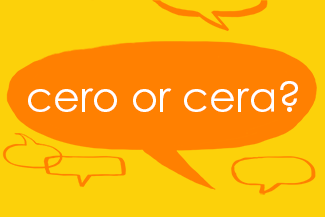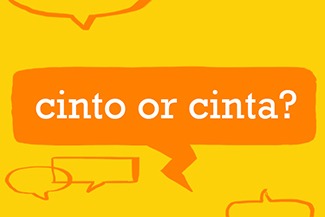¡Tres, dos, uno, cero! (Three, two, one, zero!) It’s time to polish up our knowledge of the different meanings of the Spanish nouns cero (masculine) and cera (feminine).
You can listen to the pronunciation of cero (masculine) here:
Cero with an -o (masculine) means zero (or nought or nil in some contexts), that much-used mathematical concept that originated in India and was brought to Western Europe by the Moors:
El termómetro no supera los diez grados bajo cero.
The thermometer doesn’t get above ten degrees below zero.
Pasa de cero a cien en 13,2 segundos.
It goes from nought to a hundred in 13.2 seconds.
El Castilla y el Málaga empataron a cero.
Castilla and Málaga drew nil-nil.
You can listen to the pronunciation of feminine noun cera below:
Cera with an -a (feminine) is any of several soft, mouldable, shiny and slightly greasy materials translated into English as wax. It might refer to beeswax, that substance used by bees to create their honeycombs, or to manufactured products such as candle wax and wax polish:
la cera caliente
hot wax
El aire olía a cera para muebles.
The air smelled of (wax) furniture polish.
Trabaja en un museo de cera.
She works at a wax museum.
un lápiz de cera rojo
a red wax crayon
velas de pura cera de abeja
pure beeswax candles
PUZZLE TIME
From the examples below, can you guess what encerar means?
El suelo recién encerado reluce.
Rodolfo luce gabardina en algodón encerado gris.
papel encerado
Answer: to wax; to polish
El suelo recién encerado reluce.
The recently waxed or polished floor is gleaming.
Rodolfo luce gabardina en algodón encerado gris.
Rodolfo is wearing a grey cotton waxed raincoat.
papel encerado
waxed paper
DID YOU KNOW?
A pair of Spanish nouns that are closely related to cera are cerilla (used mainly in Spain) and cerillo (used mainly in Central America) to mean match (as in a short phosphorous-tipped stick that can be struck to create a flame). They may be made of wax (hence the name) or of wood or card.
Rascó una cerilla.
She struck a match.
Alejandro encendió el cerillo y lo acercó al rostro de Julio.
Alejandro lit the match and held it up to Julio’s face.
Come back next week to shed light on another pair of nouns whose meaning varies depending on their gender and ending.



